Top 7 Cloud Computing Tools In 2024

In a world where digital transformation is paramount, the power of cloud computing tools cannot be ignored. Imagine unlocking unparalleled scalability and efficiency for your business operations. Intrigued? The allure of the cloud lies in its ability to revolutionize IT infrastructure, streamline workflows, and slash costs. But that’s just the tip of the iceberg. The real magic happens when you delve into the myriad of cloud computing tools that promise to elevate your enterprise to new heights. Ready to explore this digital frontier? Let’s dive into the essential cloud computing tools reshaping the future of technology.
Table of Contents
What is Cloud Computing

Cloud computing is a transformative technology that delivers computing services such as servers, storage, databases, networking, and software over the internet. This paradigm shift enables businesses to access resources on-demand, promoting scalability and efficiency. Instead of maintaining costly on-premises infrastructure, organizations leverage the flexibility of the cloud to optimize operations. Key to this transition are cloud computing tools, which facilitate seamless integration, management, and security of cloud services. These tools empower enterprises to harness the full potential of the cloud, driving innovation and competitive advantage in today’s digital landscape.
Top 7 Cloud Computing Tools
1. Cloudability
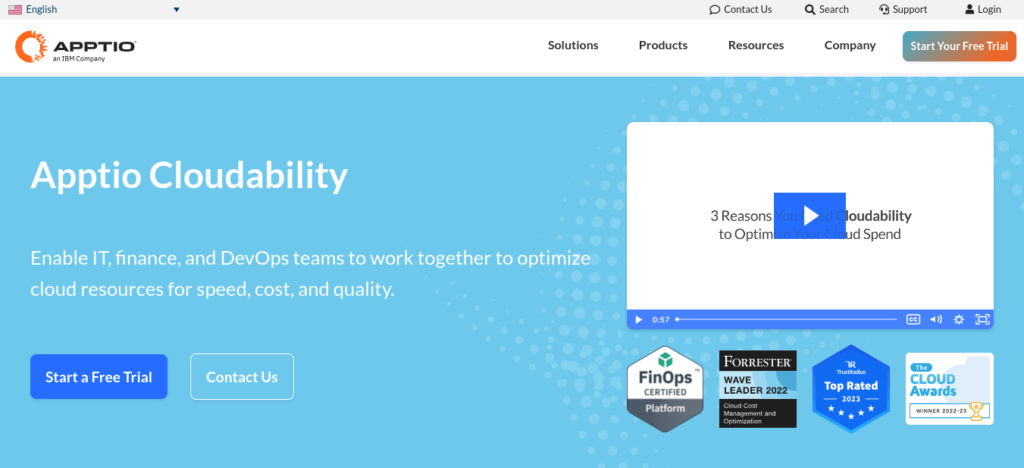
What is Cloudability
Cloudability is a sophisticated financial management platform designed to help businesses monitor and optimize their cloud expenses. By providing granular insights into spending patterns and usage, it empowers organizations to make informed decisions about their cloud investments. Leveraging advanced analytics, Cloudability offers recommendations for cost-saving measures and efficiency improvements. This makes it an invaluable asset among cloud computing tools. Its ability to allocate costs accurately across departments and projects ensures transparency and accountability, driving financial optimization in the dynamic world of cloud computing.
Key Features of Cloudability
- Cost Allocation: Cloudability ensures precise cost attribution, enabling businesses to allocate expenses accurately across various departments, projects, and business units. This transparency fosters accountability and efficient budget management.
- Budgeting and Forecasting: It provides robust tools for creating and managing budgets, as well as forecasting future cloud expenses. This feature helps organizations anticipate financial needs and avoid unexpected costs.
- Real-Time Analytics: With real-time analytics, users can access detailed reports and insights into cloud spending patterns. This information is critical for making informed decisions and identifying cost-saving opportunities.
- Optimization Recommendations: Cloudability delivers actionable insights to optimize resource usage, helping businesses reduce unnecessary expenses and enhance overall efficiency.
2. Cloudyn
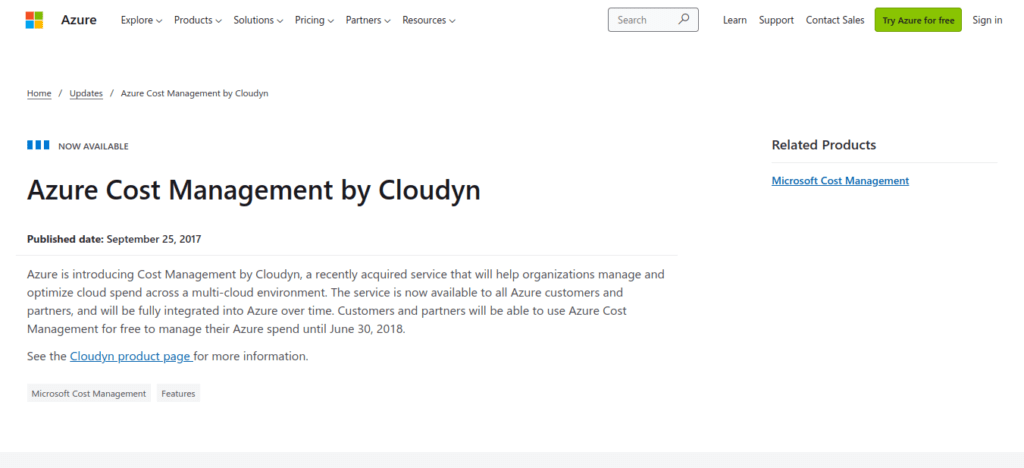
What is Cloudyn
Cloudyn is a comprehensive cloud monitoring and optimization platform designed to help businesses manage their cloud environments efficiently. Acquired by Microsoft, it integrates seamlessly with Azure, AWS, and Google Cloud. Cloudyn offers detailed insights into cost management, resource utilization, and performance metrics. By leveraging these cloud computing tools, organizations can gain visibility into their cloud expenses, identify inefficiencies, and optimize their cloud infrastructure. This enables better financial control and operational efficiency, making Cloudyn an essential asset for businesses navigating the complexities of multi-cloud environments.
Key Features of Cloudyn
- Multi-Cloud Visibility: Offering comprehensive visibility across multiple cloud platforms like AWS, Azure, and Google Cloud, Cloudyn centralizes monitoring and management tasks.
- Cost Optimization: Through advanced analytics and predictive insights, Cloudyn helps businesses optimize cloud expenditures, identifying cost-saving opportunities and improving budget allocation.
- Performance Monitoring: Real-time monitoring and reporting capabilities ensure proactive management of cloud resources, enhancing performance and reliability.
- Security and Compliance: Cloudyn ensures adherence to industry regulations and internal policies, mitigating risks associated with data security and compliance in diverse cloud environments.
- Scalability and Flexibility: Scalable to meet evolving business needs, Cloudyn supports organizations in scaling their cloud infrastructure efficiently.
3. Informatica
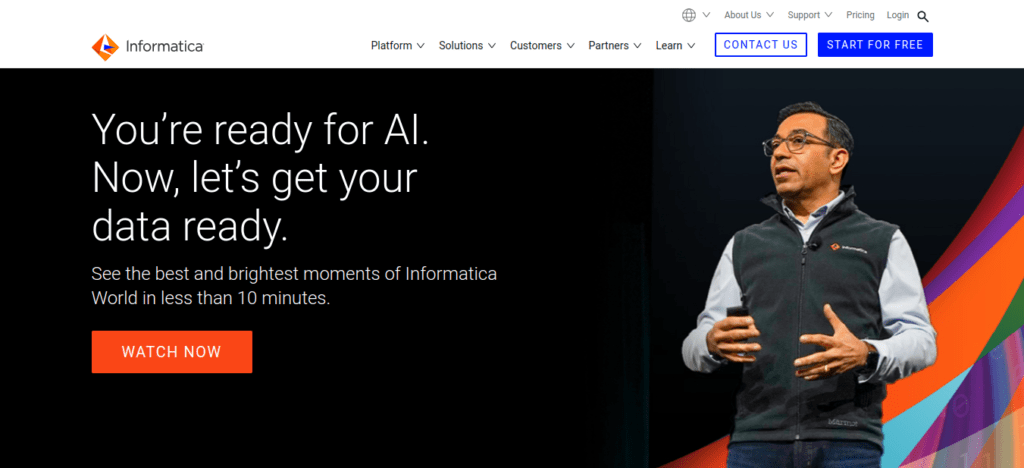
What is Informatica
Informatica is a leading cloud computing tool renowned for its prowess in data integration and management. It empowers organizations to seamlessly integrate data from disparate sources, facilitating cohesive data management strategies. Using advanced algorithms and automation, Informatica ensures data quality and consistency across the board, making it a cornerstone in enterprise data ecosystems. Its scalability and flexibility accommodate the diverse needs of modern businesses, enabling efficient handling of large volumes of data. Informatica also excels in metadata management, providing comprehensive insights into data assets and their usage. By leveraging Informatica’s robust capabilities, businesses can optimize their cloud computing environments, enhancing operational efficiency and driving informed decision-making processes.
Key Features of Informatica
- Data Integration: Seamlessly integrates data from diverse sources, ensuring coherence and reliability in enterprise data ecosystems.
- Data Quality: Utilizes advanced algorithms to cleanse and enrich data, maintaining high standards of accuracy and completeness.
- Metadata Management: Provides comprehensive metadata capabilities, offering insights into data lineage and usage across the organization.
- Scalability: Scales effortlessly to handle large volumes of data, supporting enterprise-level data processing needs.
- Cloud Integration: Facilitates smooth integration with cloud platforms, enabling seamless data flow between on-premises and cloud environments.
4. CloudHub
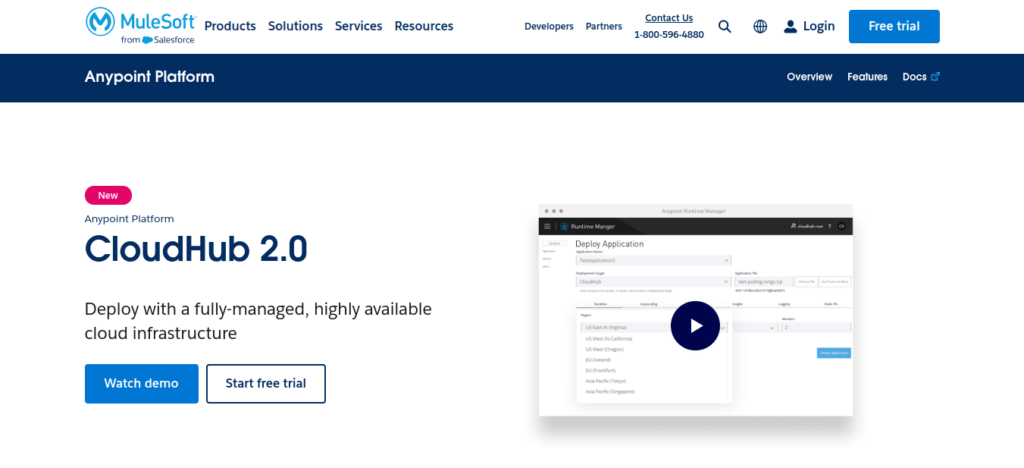
What is CloudHub
CloudHub is a powerful integration platform as a service (iPaaS) offered by MuleSoft, designed to facilitate seamless connectivity and data exchange between applications and systems. It empowers organizations to build, deploy, and manage integrations quickly and efficiently in the cloud. With its robust capabilities in cloud computing tools, CloudHub supports both on-premises and cloud-based integrations, offering scalability, security, and real-time monitoring. This makes it an invaluable tool for businesses looking to streamline operations and enhance agility in today’s interconnected digital landscape.
Key Features of CloudHub
- Integration Capabilities: CloudHub enables seamless integration of applications and data across cloud and on-premises environments, supporting diverse integration scenarios.
- API Management: It provides robust API management functionalities, facilitating secure and efficient API creation, deployment, and governance.
- Scalability: CloudHub scales dynamically to handle varying workloads and demands, ensuring performance and reliability under high traffic conditions.
- Real-Time Monitoring: The platform offers real-time visibility and monitoring of integrations, providing actionable insights into performance metrics and operational health.
- Security: CloudHub incorporates advanced security measures, including data encryption and identity management, to safeguard sensitive information and ensure compliance with regulatory standards.
5. Chef
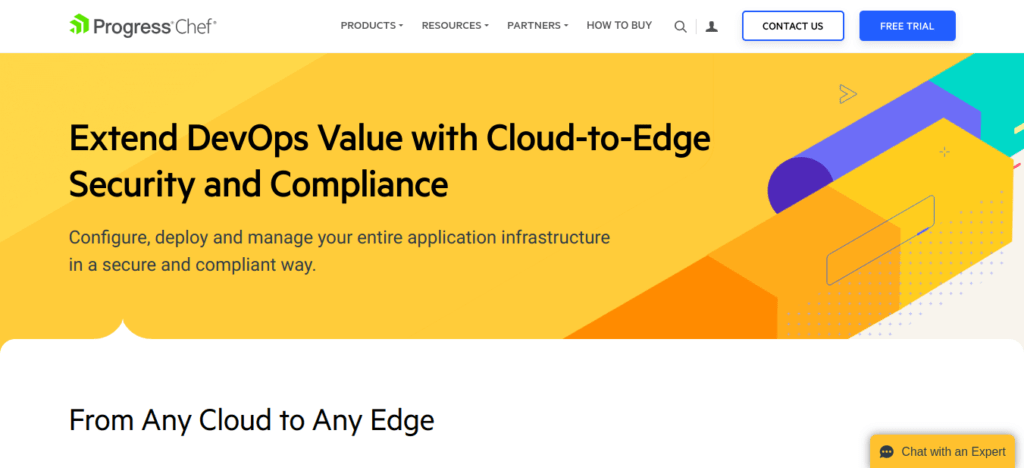
What is Chef
Chef is an advanced automation platform designed to streamline the management of cloud computing tools and infrastructure. It operates on the principle of infrastructure as code (IaC), enabling organizations to define their infrastructure requirements through code. This approach ensures consistency and repeatability in infrastructure deployment and management. Chef automates configuration management, application deployment, and compliance across heterogeneous environments, including cloud and on-premises setups. By leveraging Chef’s robust capabilities, businesses can achieve operational efficiency, reduce manual intervention, and accelerate the delivery of applications and services in modern IT landscapes.
Key Features of Chef
- Infrastructure as Code (IaC): Chef allows organizations to define and manage infrastructure configurations through code, ensuring consistency and repeatability.
- Automation: It automates the deployment and configuration of applications and infrastructure components, reducing manual effort and human error.
- Scalability: Chef scales effortlessly to manage infrastructure across diverse environments, from small deployments to large, complex cloud setups.
- Compliance: Ensures that infrastructure configurations adhere to regulatory and organizational policies, enhancing security and governance.
- Integration: Integrates seamlessly with various cloud platforms and on-premises environments, supporting hybrid IT infrastructures.
6. Puppet
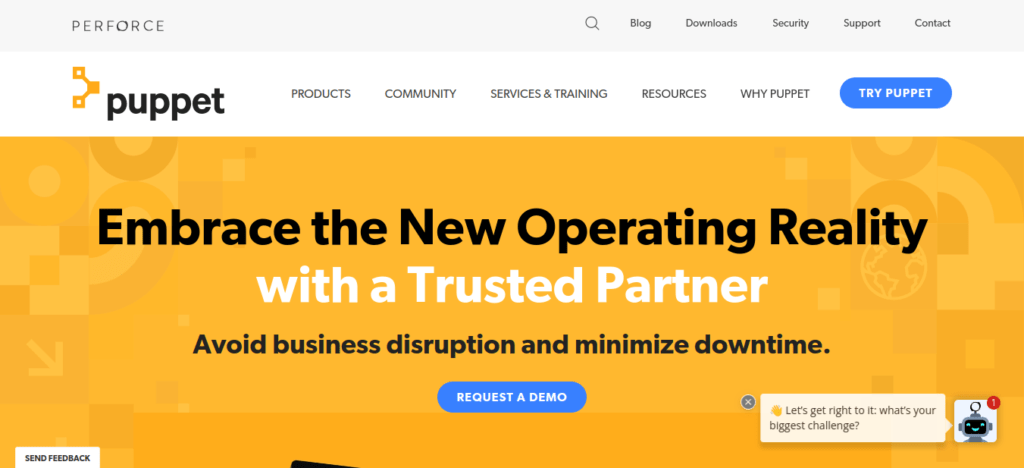
What is Puppet
Puppet is an advanced configuration management tool that automates the provisioning, configuration, and management of cloud computing tools and infrastructure. Operating on the principle of infrastructure as code (IaC), Puppet allows organizations to define their infrastructure requirements in a declarative language. This approach ensures consistency and scalability across cloud and on-premises environments. Puppet automates repetitive tasks, such as software deployment and system updates, enhancing operational efficiency and reducing manual errors. By leveraging Puppet’s capabilities, businesses can achieve faster deployment cycles, maintain configuration consistency, and enforce compliance with organizational policies in complex IT infrastructures.
Key Features of Puppet
- Infrastructure as Code (IaC): Puppet enables organizations to define and manage infrastructure configurations programmatically, ensuring consistency and scalability.
- Automation: It automates the provisioning, deployment, and management of cloud and on-premises infrastructure, reducing manual effort and operational overhead.
- Configuration Management: Puppet ensures that systems remain in desired states, enforcing configuration policies across diverse environments.
- Scalability: Scalable to manage thousands of nodes simultaneously, Puppet supports dynamic and growing cloud infrastructures.
- Reporting and Visualization: Provides detailed reporting and visualization of infrastructure states and changes, aiding in troubleshooting and compliance audits.
7. AtomSphere
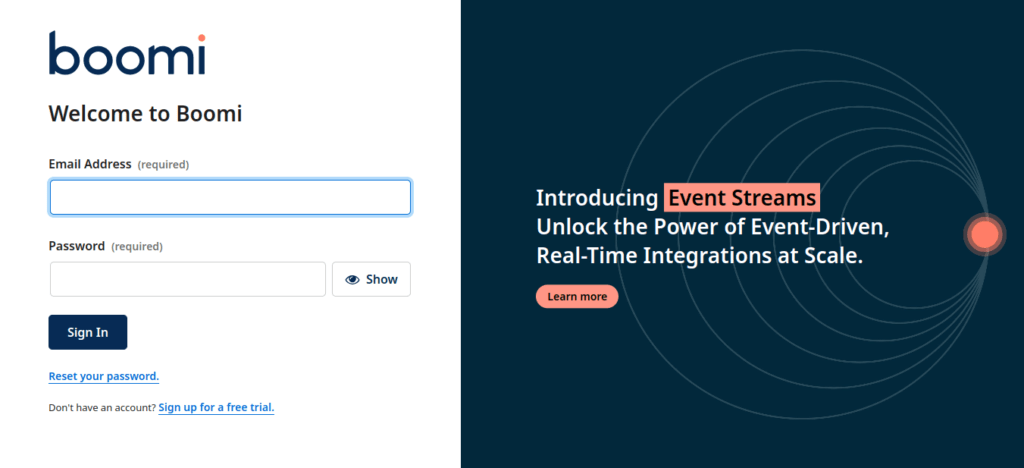
What is AtomSphere
AtomSphere is an advanced integration platform as a service (iPaaS) renowned for its capability to orchestrate data and application integrations across diverse cloud computing tools and environments. Developed by Dell Boomi, AtomSphere facilitates seamless connectivity between cloud-based and on-premises applications, enabling businesses to achieve operational agility and efficiency. Its intuitive drag-and-drop interface simplifies integration workflows, while robust connectors ensure reliable data synchronization and management. AtomSphere supports real-time data integration and API management, empowering organizations to innovate and respond swiftly to changing market demands in today’s interconnected digital landscape.
Key Features of AtomSphere
- Drag-and-Drop Interface: AtomSphere offers an intuitive interface for designing integration workflows, enabling users to create complex integrations effortlessly.
- Connector Library: It boasts a comprehensive library of connectors that facilitate integration with various applications and systems, both cloud-based and on-premises.
- Real-Time Integration: Supports real-time data synchronization and processing, ensuring timely and accurate data flow across integrated systems.
- API Management: Provides tools for creating, publishing, and managing APIs, empowering organizations to expose their data and services securely.
- Scalability: AtomSphere scales dynamically to meet growing integration demands, supporting enterprises of all sizes with agile and scalable integration solutions.
In the digital age, cloud computing tools are the backbone of IT innovation, enabling businesses to scale, automate, and optimize like never before.
Conclusion
In conclusion, cloud computing tools play a pivotal role in modernizing IT infrastructures and enhancing operational efficiency. Platforms like Cloudability, Cloudyn, Informatica, CloudHub, Chef, Puppet, and AtomSphere offer robust solutions for managing, optimizing, and integrating cloud environments. These tools empower businesses to streamline operations, improve scalability, and drive innovation through automation and real-time data management. As organizations continue to embrace digital transformation, leveraging these advanced tools becomes essential for staying competitive in a rapidly evolving technological landscape. By investing in the right cloud computing tools, businesses can achieve cost savings, enhance agility, and deliver superior customer experiences in the digital age.
FAQ: Cloud Computing Tools
1. What are cloud computing tools? Cloud computing tools are software solutions designed to manage, optimize, and integrate cloud environments. They facilitate tasks such as data integration, infrastructure management, and real-time monitoring.
2. Why are cloud computing tools important? Cloud computing tools are crucial for modern IT operations as they enhance operational efficiency, improve scalability, and enable automation. They help businesses manage cloud infrastructure effectively, ensuring consistent performance and reliability.
3. How do cloud computing tools enhance data management? Cloud computing tools like Informatica and CloudHub provide robust data integration and management capabilities. They ensure data consistency, quality, and real-time synchronization across diverse cloud and on-premises environments.
4. Can cloud computing tools help in cost management? Yes, tools like Cloudability and Cloudyn offer detailed insights into cloud spending, enabling businesses to optimize costs and enhance budget management through detailed reporting and analysis.
5. What are some popular cloud computing tools? Popular cloud computing tools include Cloudability, Cloudyn, Informatica, CloudHub, Chef, Puppet, and AtomSphere. Each tool offers unique features tailored to different aspects of cloud management and integration.




One Comment